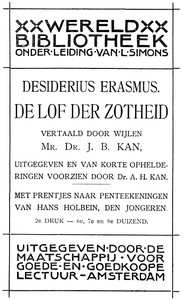| Author |
Erasmus, Desiderius, 1469-1536 |
| Illustrator |
Holbein, Hans, 1497-1543 |
| Translator |
Kan, J. B. |
| Uniform Title |
Moriae encomium. Dutch
|
| Title |
De Lof der Zotheid
|
| Note |
Wikipedia page about this book: https://en.wikipedia.org/wiki/In_Praise_of_Folly Wikipedia page about this book: https://nl.wikipedia.org/wiki/Lof_der_zotheid
|
| Note |
Reading ease score: 63.8 (8th & 9th grade). Neither easy nor difficult to read.
|
| Credits |
Produced by Jeroen Hellingman and the Online Distributed
Proofreading Team at https://www.pgdp.net/
|
| Summary |
"De Lof der Zotheid" by Desiderius Erasmus is a satirical essay written in the early 16th century. The work is a critique of societal norms, religious practices, and the folly of human behavior, narrated from the perspective of the personification of Foolishness, who humorously celebrates her own attributes. Erasmus uses wit and irony to challenge the status quo and provoke reflection on the nature of wisdom and folly. The opening of the work introduces the theme of Foolishness addressing an audience, declaring her role in alleviating the burdens of life through her divine powers. She claims credit for the joy and youthful spirit that accompany human existence, suggesting that life without folly would be excessively serious and dull. The narrator, as Foolishness, speaks highly of herself, criticizing those who engage in wisdom and seriousness, and sets the stage for a broader examination of how folly underpins various aspects of society, including friendships, love, and even governance. This playful tone establishes the character and intention of the essay as a thoughtful and entertaining critique of humanity. (This is an automatically generated summary.)
|
| Language |
Dutch |
| LoC Class |
PA: Language and Literatures: Classical Languages and Literature
|
| Subject |
Folly -- Early works to 1800
|
| Category |
Text |
| EBook-No. |
27846 |
| Release Date |
Jan 20, 2009 |
| Most Recently Updated |
Jan 4, 2021 |
| Copyright Status |
Public domain in the USA. |
| Downloads |
430 downloads in the last 30 days. |
|
Project Gutenberg eBooks are always free!
|

